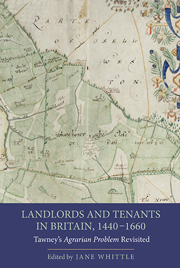Book contents
- Frontmatter
- Contents
- List of Figures
- List of Tables
- Abbreviations
- List of Contributors
- Acknowledgements
- Foreword
- Introduction: Tawney's Agrarian Problem Revisited
- 1 The Agrarian Problem, 1440–1520
- 2 Common Law and Manor Courts: Lords, Copyholders and Doing Justice in Early Tudor England
- 3 Negotiating Enclosure in Sixteenth-Century Yorkshire: The South Cave Dispute, 1530–1536
- 4 The Politics of Enclosure in Elizabethan England: Contesting ‘Neighbourship’ in Chinley (Derbyshire)
- 5 The Loss of Athelstan's Gift: The Politics of Popular Memory in Malmesbury, 1607–1633
- 6 In Search of the Scottish Agrarian Problem
- 7 The Transfer to Leasehold on Durham Cathedral Estate, 1541–1626
- 8 The Financial Rewards of Winning the Battle for Secure Customary Tenure
- 9 Risks and Rewards in Wasteland Enclosure: Lowland Lancashire c.1500–1650
- 10 Improving Landlords or Villains of the Piece? A Case Study of Early Seventeenth-Century Norfolk
- 11 The Agrarian Problem in Revolutionary England
- 12 Agrarian Capitalism and Merchant Capitalism: Tawney, Dobb, Brenner and Beyond
- Conclusions
- Select Bibliography
- Index
6 - In Search of the Scottish Agrarian Problem
Published online by Cambridge University Press: 05 September 2013
- Frontmatter
- Contents
- List of Figures
- List of Tables
- Abbreviations
- List of Contributors
- Acknowledgements
- Foreword
- Introduction: Tawney's Agrarian Problem Revisited
- 1 The Agrarian Problem, 1440–1520
- 2 Common Law and Manor Courts: Lords, Copyholders and Doing Justice in Early Tudor England
- 3 Negotiating Enclosure in Sixteenth-Century Yorkshire: The South Cave Dispute, 1530–1536
- 4 The Politics of Enclosure in Elizabethan England: Contesting ‘Neighbourship’ in Chinley (Derbyshire)
- 5 The Loss of Athelstan's Gift: The Politics of Popular Memory in Malmesbury, 1607–1633
- 6 In Search of the Scottish Agrarian Problem
- 7 The Transfer to Leasehold on Durham Cathedral Estate, 1541–1626
- 8 The Financial Rewards of Winning the Battle for Secure Customary Tenure
- 9 Risks and Rewards in Wasteland Enclosure: Lowland Lancashire c.1500–1650
- 10 Improving Landlords or Villains of the Piece? A Case Study of Early Seventeenth-Century Norfolk
- 11 The Agrarian Problem in Revolutionary England
- 12 Agrarian Capitalism and Merchant Capitalism: Tawney, Dobb, Brenner and Beyond
- Conclusions
- Select Bibliography
- Index
Summary
Any one who turns over the Statutes and State Papers of the sixteenth century will be aware that statesmen were much exercised with an agrarian problem, which they thought to be comparatively new, and any one who follows the matter further will find the problem to have an importance at once economic, legal, and political.
This was how R. H. Tawney introduced his seminal work on the ‘agrarian problem’ in sixteenth-century England. I would like to ask: could statements comparable to Tawney's be made about Scotland? The question is a difficult one – but, perhaps for that very reason, an inviting one. Hitherto, the agrarian history of sixteenth-century Scotland has seemed particularly hard to penetrate from an English viewpoint. Work that has been done on subsequent periods of Scottish agriculture, especially the later seventeenth century onwards, has enabled English historians to address it in familiar ways and to incorporate it in broader patterns of agrarian change; but the sixteenth century has remained ‘frustratingly obscure’. An attempt to lift some of this obscurity is surely worthwhile.
The search, as it proceeds, will indeed be ‘economic, legal, and political’. The neglected legal and political aspects will be emphasised, but always with the purpose of relating them to the economy. The results, it will be suggested, indicate some significant parallel processes at work in the English and Scottish agrarian economies.
- Type
- Chapter
- Information
- Landlords and Tenants in Britain, 1440-1660Tawney's 'Agrarian Problem' Revisited, pp. 100 - 116Publisher: Boydell & BrewerPrint publication year: 2013

